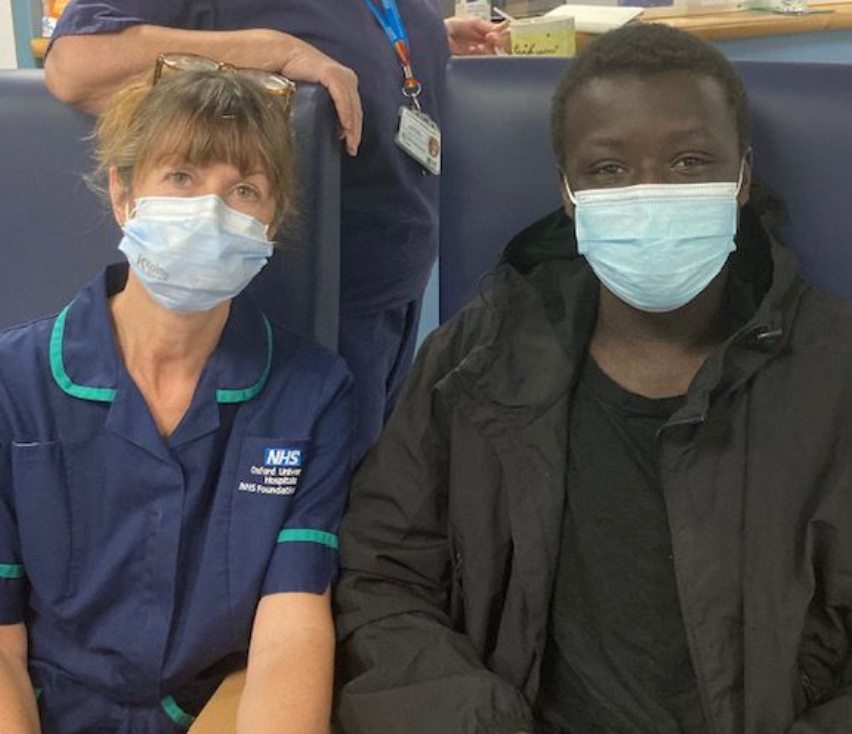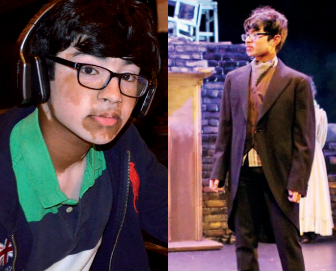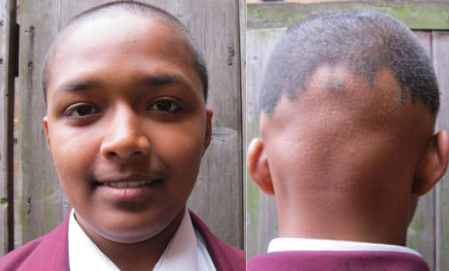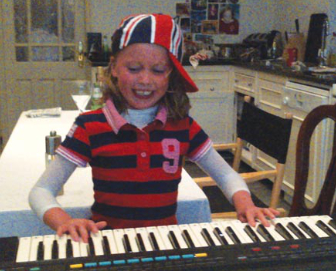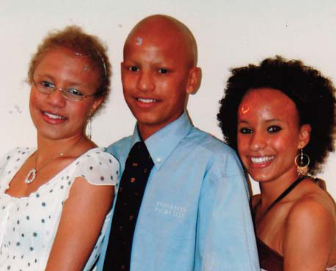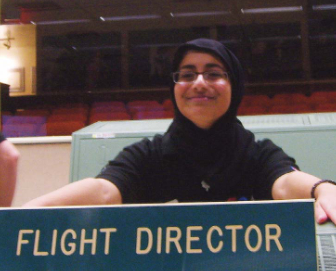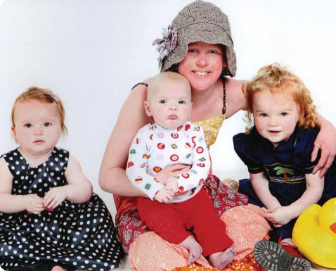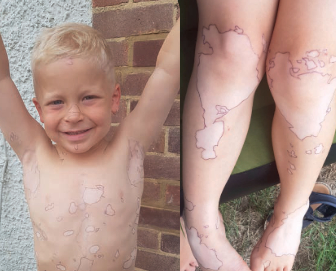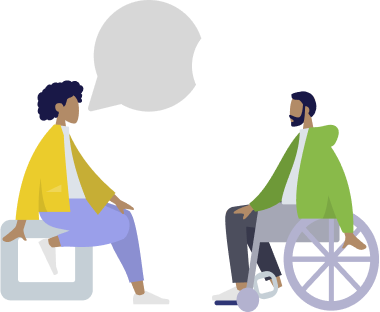
Young people’s stories
Stories of other people’s experiences can help you to understand or learn more about your condition. We want to build a community and create a supportive space for those affected by their conditions. We hope you find it helpful reading or hearing about how others have been affected.
DJ’s story about his eczema
I’ve had eczema ever since I gained consciousness at a young age and ever since then it’s been a challenge. My skin would come out in massive flares behind the back of my knees not allowing me to bend my knees. Another time in secondary school I believe I had itched off the skin behind my knees and it had come back again in the morning only to be stuck to my clothes, so somehow my skin and my pajama bottoms were combined. I remember being carried down the stairs by my mother on her back because moving my legs was extremely painful for me.
The hardest things:
I have to check foods to make sure what I was eating wouldn’t flare up my skin, I can’t go out in the sun too long, I have to keep myself at a reasonable temperature, making sure I’m not doing sports because if I did the sweat I produced would make my skin stiff.
Since I’m still somewhat young all these memories of things I wasn’t allowed to do are still fresh, I couldn’t participate in the fun run, sports day etc.
I believe these to be minor but what I wanted the most was to not have eczema and be stricken by things like these.
I would also like to mention bathing, even these days the water has to be hot, it can’t be warm or cold, it has to be hot otherwise when I get out I don’t know how to explain the sensation. I guess it felt tight or dry I guess? Even though it was wet.
Another mention would be clothing – clothing wasn’t one of my biggest problems with eczema but it definitely was one of the most annoying. The wrong materials would pick at my skin as I would walk, so if I picked the wrong material it would pick at my skin all day until I got home from school.
I suppose I also recently discovered the psychological aspects that eczema has on the mind. I just remember being young and crying myself to sleep thinking I was cursed – I was kind of superstitious so I thought I was being punished for something I had done in a previous life. I also thought it had to do with the future too. I do commend those who have the same condition and manage to smile consistently and stay positive, In conclusion, I think a lot of aspects of living are connected to my eczema, of course, I can’t speak for others but this was just a small insight into my experience.
Going to the doctors frequently as well, it wasn’t hard but it was kind of financially demanding on my family, very necessary trips but in the aspect of finances, it was quite detrimental. And school attendance etc, I may have had to miss things just to take care of my health. I also tried not to get in to trouble – I was a bit of a crybaby when I was younger I cried quite frequently and easily in my opinion might still be true to this day but when I would cry, my whole body would feel hot (I don’t know if this is everyone im uneducated in this area) and I would feel the heat all over the body, causing me to itch. The school knew this and thinking back on it now I notice how they took a kinder approach on me for the times I DID get in trouble, which was rare but everyone has their moments!
What has helped the most?
Well the medicine I’m currently on is a big help but i suppose just other things like changing my mindset from what I used to think. So for example previously I would think ”I’m cursed” and a lot of other things along those lines or even worse but now I just try tricks to minimise the thoughts. I don’t really recommend this for anyone else it’s just something that has worked for me, So if it flared up these days I just say ”It could be worse” or ”It is what it is”, if I worried about it constantly I wouldn’t get anything done. So I choose to focus on it when necessary and try to forget it when possible. No matter how long you’ve had it, somewhere at the back of your mind you just acknowledge that it’s there and might not go away, This is what helped me. I kinda chose to go on the path of acceptance and attempted to be unbothered about it.
Did you find talking to the psychologist in the clinic helpful at any time?
I believe I went to the psychologist in the clinic twice, maybe my memory isn’t that good! But yeah I think the younger me found the psychologist to be helpful. I was desperate to feel better so whatever advice I got I took it.
What are your hopes for the future?
Well, a hope of mine would be to have managed and under control conditions living peacefully, I don’t want anything grand I just want to live in a consistent and constant state of peace with my mental, physical and emotional health. Although I would hope that it goes away, I do remember my mother told me my elder brother had eczema for a little while and it disappeared on its own, I would be thankful if a miracle like that happened. But other than that yeah, just peace, managed skin and less doctors visits.
Do you have any concerns about the future?
I do suppose my skin is one of two of my main concerns. I don’t honestly know how I’ll be able to cope if it reverts. The thing is I can say that I’ll do what I’m doing it now and trying to brush it off and try to get it back under control but I’m not gonna know until that time comes, so as rationally as I want to present I don’t know if it’s possible at THAT point in time. All I can hope is that I can handle it.
The thing is I would love to give advice and insight on to how to deal with it but in my eyes I don’t believe I can, I think in the end every person dealing with it will come to their own conclusion of how it was and sure they may be given gems by a few people and ushered to good health by dermatologists. But it’s a culmination
of all of these minor + major things that lead to the inevitable outcome of it, the outcome being their story and how they dealt with it. My only hope is that sharing my experience can help you to learn from it.
Pranav's story about vitiligo
Pranav is 13, and he’s always busy with lots of
interests. He likes K-pop, and he plays the drums. Hockey is his favourite sport, and he likes writing too, creating futuristic stories set in fantasy worlds. Recently he’s enjoyed acting in school plays ‘But when I grow up, I’d like to be an architect,’ muses Pranav, ‘or perhaps a game-designer.’
Pranav’s vitiligo started when he was about four years old. When he was little, he says, no one bothered about it at school. But now that he’s getting older, he’s aware of people staring when he goes out. ‘My friends don’t care,’ he says, ‘and we don’t talk about it much. When people are familiar with it, it’s less of an issue.’ But sometimes now it can feel like an effort to go out somewhere new.
Pranav has had some difficult times particularly when they have been to India to visit relatives. ‘It’s a different culture over there,’ says his mum, Veni. ‘People ask very direct questions, and they offer advice. It got very repetitive, and Pranav wasn’t very happy. So now we go on holiday in Europe or the States, where we haven’t had these problems.’
Teachers at Pranav’s school have been understanding and supportive. They put Pranav in touch with an older boy at his school who also has vitiligo. Together they’ve discussed the pros and cons of using camouflage to cover the lighter patches. ‘Camouflage is not for me,’ says Pranav. ‘Everyone knows that I have vitiligo,’ he says, ‘so there’s no point in hiding it. It would come out anyway.’
He was also offered the chance to talk to a counsellor at school. ‘But I didn’t want to miss break-time with my friends,’ Pranav grins.
What is Pranav’s advice for living with vitiligo? ‘Don’t feel you should only stay at home. If someone stares, it’s just for a couple of seconds, and then they’re gone. You hope they’ll think about it afterwards. ‘And vitiligo can help you too,’ he adds. ‘If people judge you because you’ve got vitiligo, then they’re not a true friend. So vitiligo helps you know who your real friends are.’
Story provided via the Birmingham Women’s and Children’s NHS Foundation trust.
Usayd's story about his alopecia
He plays football and hockey, and he likes to keep fit and strong with his dad, doing push-ups and sit-ups.
Usayd started losing his hair when he was 9. At first, he lost hair at the back of his head, and then a second patch appeared at his crown. Now he wears his hair shaved very short. His dad cuts his hair using an electric shaver first, an then a razor for an even closer shave.
“At first, all my friends asked what has happened to your head? How did you lose your hair?” Says Usayd. “it got annoying. I did mind a bit, when more and more people kept asking. They wouldn’t stop! A few people laughed too, but not so many. But now, after a while. everyone has got used to it, and they’ve stopped asking”.
Usayd saw various doctors who offered him creams and liquids to rub into his scalp. But because of his age, he couldn’t use the strongest treatments. And the doctors said, in any case, it was hit or miss whether Usayd’s hair would grow back.
After trying various other treatments, including a roller to increase blood circulation to his scalp, Usayd has decided not to go back to the hospital for a while. It seems as if the doctors don’t have much to offer him. Usayd’s advice about dealing with alopecia is short and to the point. ‘Don’t worry about it,’ he says.‘You’ve just got to deal with it. I’ve had a bit of teasing, a bit of blazing. I just make sure to blaze them back!’.
Amina, Usayd’s mum says: I see Usayd’s alopecia as a test from Allah. I say to him, try to have patience with what Allah has ordained. Mashallah (thanks to God), he’s healthy, and we take solace from that. Usayd has a young cousin who has a painful illness, and so we try to remember that there are others who struggle with greater difficulties.We look to them for wisdom to deal with this.
Story provided via the Birmingham Women’s and Children’s NHS Foundation trust.
Annabelle's story about her ichthyosis
Annabelle is 8. She has a form of ichthyosis called CIE. ‘Only around three in a million people are diagnosed with CIE each year,’ says her dad, Paul. Annabelle has been on telly to talk about it. ‘So I’m a little bit famous!’ she grins.
After a bath first thing in the morning, Annabelle puts cream all over her skin, and again at toast time at school, at lunchtime and again after a bath at the end of the day. ‘If you don’t put cream on, you get dry and itchy,’ she explains. A helper at school lends a hand putting the cream on carefully, downwards in the direction of the hair follicles, otherwise it could clog the pores.
Annabelle felt upset recently when a friend didn’t want to touch or hold hands. It turned out the friend was worried that she might catch ichthyosis. And sometimes people can make thoughtless and hurtful comments. So Annabelle’s parents came into school and explained to everyone that Annabelle has to look after her skin, because it works differently – and that ichthyosis isn’t catching.
Annabelle’s family does a lot of fundraising and education work for the Ichthyosis Support Group (ISG). Recently Annabelle met another girl the same age with CIE through the group. ‘We look like sisters!’ she laughs.‘It’s important to know someone else who has the same experience,’ adds Paul.
Story provided via the Birmingham Women’s and Children’s NHS Foundation trust.
Evan and Lauren's story about alopecia
Evan, Lauren and Jourdanna are 16 year-old triplets. Evan has lost his hair, while Lauren has sparsely-growing hair.
“My hair is like baby hair” says Lauren. “It’s thin, and it never grows very long, especially where I sleep on my back. I don’t like the back of my head”, she admits.
The tripleys agree that it’s tough to live with media images of perfect beauty. ‘My dream would be to have long hair,’ says Lauren, ‘or to straighten it. You
aspire, you wish… But I don’t have to hide it, and nobody stares. It’s just something you have to get used to,’ she adds.
Evan first lost his hair when he was 18 months old. Over the years, it has come and gone. Now Evan’s hair grows in patches, so he shaves it off each week. Some people know, but others assume he’s choosing to keep it short.
‘Some boys wear their hair cropped anyway,’ he says. ‘And maybe it’s more acceptable as a young black man’.
Evan is into rugby, running, kickboxing and swimming. But he had some problems with name-calling at school. Eventually, he told his parents. They talked with the teachers, and it all calmed down. ‘We tried to give him the words to deal with it,’ says Sarah, the triplets’ mum. ‘We wanted him to learn that the bigger person walks away from a fight.’
‘My advice is to ignore name-calling,’ says Evan. ‘If it’s just to get a reaction, it will stop. Be strong. Don’t let it get to you. Tell someone. Get help.’
Evan and Lauren’s sister Jourdanna has masses of thick, curly hair. ‘It’s kind of annoying,’ nods Lauren, ‘but the three of us are close – even if we argue all the time!’
Dad BJ is concerned about dating. ‘Will girls accept Evan as he is?’ he frowns. ‘Course they will!’ chorus Lauren and Jourdanna. ‘Everyone asks if they can stroke my head,’ smiles Evan. ‘And they kiss it! You have to laugh…
Story provided via the Birmingham Women’s and Children’s NHS Foundation trust.
Sumaya's story about alopecia
Sumaya lost her hair out of the blue several years ago when she was 8 years old. As a Muslim girl, Sumaya saw straight away that she could start to wear a headscarf. ‘It felt protective,’ she says. ‘It protected me from other people’s awkwardness.’
Even so, Sumaya experienced some bullying at school, which she felt wasn’t dealt with effectively. She says that both teachers and the Asian community need to understand more about alopecia.
‘It did affect my confidence for a while,’ she admits. ‘There were some difficult moments, with classmates I’d known all my life. It affected my parents too. My mum says she wishes it had happened to her, instead of me. But I came to terms with it more quickly than other people expected. I thought if I could be happy, then they would come to terms with it too.’
Sumaya sometimes wears a wig for special occasions, like family weddings. But generally, she’s more comfortable wearing her headscarf.
Starting at secondary school offered a fresh start for Sumaya. Early on, in a discussion about bullying, she decided to tell her class that she had lost her hair. Five years later, apart from her closest friends, she thinks most people have forgotten now.
Now 17, Sumaya is always busy. ‘I concentrate on my education and my hobbies – I love reading. I am going on a Duke of Edinburgh expedition, and I won a trip to NASA last summer. There are so many things I’m concerned with, my hair loss doesn’t concern me.
Sumaya’s alopecia is probably caused by an auto-immune response. ‘It is hard not knowing what causes it,’ she says. ‘I’ve tried different treatments. We always ask the consultant if there is anything new to try. I think there should be more research to find causes and cures. It’s good to remain hopeful, but I try not to let it take over. That could stop you from doing other things.’
Sumaya finds her faith helps her to cope.‘I see my alopecia as a test from God,’ she says, ‘and God also gives me the strength to cope with it. When my hair first fell out, the doctors said it might never come back, even if I live to be 80. It is in God’s hands whether my hair will ever grow back.
‘It’s a big thing to cope with, but once you’ve got over it, you’re over it. It’s a part of me, now, my scarf and my alopecia.
Story provided via the Birmingham Women’s and Children’s NHS Foundation trust.
Amy's story about ichthyosis
Amy is 11 years old. She lives on her family’s farm near Bakewell, Derbyshire, where she helps to feed the calves and lambs, especially orphan lambs. And Amy loves horse-riding.
Amy has a rare form of ichthyosis, called Netherton’s syndrome. She needs to bathe and use cream all over her skin twice a day. Her skin is red and itchy, and it gets blotchy and swells up when she is anxious or tired, or even just excited. Then Amy needs to take anti-histamine pills to calm her skin. She finds it helpful to distract herself, too. ‘Thinking about horses always calms me down,’ she says.
When Amy was born, it took the doctors a while to work out what her condition was, and how to treat her. She became dehydrated after a few days. Nowadays, because of Amy, doctors know how to keep Netherton’s babies more comfortable
Amy’s condition means she has lots of allergic reactions. She’s allergic to dog hair – so they have a poodle, because poodles don’t moult. She is even allergic to horses, and has to be careful not to touch her eyes until she has washed her hands. She carries an EpiPen in case of a strong reaction.
‘Anything Amy wants to do, she’ll find a way,’ says her mum, Lisa. For instance, before she goes swimming, she puts on as much grease as a channel swimmer. ‘But I go swimming!’ says Amy.
‘When I was 6 or 7, I thought I was the only person in the world with Netherton’s,’ says Amy. ‘But the doctor put me in touch with another girl with Netherton’s at my hospital. It’s good to be in touch’.
Story provided via the Birmingham Women’s and Children’s NHS Foundation trust.
Tommy's story about vitiligo
Five-year-old Tommy has lots of white spots – that’s what he calls his vitiligo. Tommy knows he has to take care to avoid burning in the sun. He loves being outdoors, so he makes sure to use plenty of sunscreen. He’s a sporty boy and a keen footballer, and he plays 5-a-side in the Little Dribblers. ‘I’ve scored 500 goals!’ he says proudly. And Tommy loves roller-booting too with his big sister, Isabella.
When other children ask him about his white spots, Tommy jokes, ‘I’m like a Dalmatian!’ He and Isabella love the film 101 Dalmatians. ‘We’ve watched it five times!’ he says.
Tommy’s first white spot appeared when he was a baby. His vitiligo has been growing ever since, with a big increase in the last year. ‘I think 50% of his skin is covered now,’ says his mum, Jennifer. ‘He’s confident in his skin, and we try to make sure it doesn’t affect him psychologically,’ she says.
But Tommy was upset recently when he grazed his elbow, because he thought it might make a new white spot. ‘We just try to keep things normal,’ Jennifer adds.
Out in his Nan’s garden one summery day, Tommy started drawing lines around his spots. ‘So we joined in,’ says Jennifer. ‘We drew round all of them. It was fun! He said it tickled. He looks like an atlas, and he loved it.’
Jennifer’s advice for other families? ‘Don’t hide or cover up. Just love them for who they are.’
Tommy has never met another child with white spots. ‘It would be good to meet up with other families,’ says Jennifer. She believes that children who are faced with being different become strong. ‘They can learn a power that other children will never understand, without that everyday battle. I’m so proud of how Tommy deals with it, even at his young age.’
Story provided via the Birmingham Women’s and Children’s NHS Foundation trust.
What next? Find more information you might be looking for:
A growing network of Dermatologists and young people working together
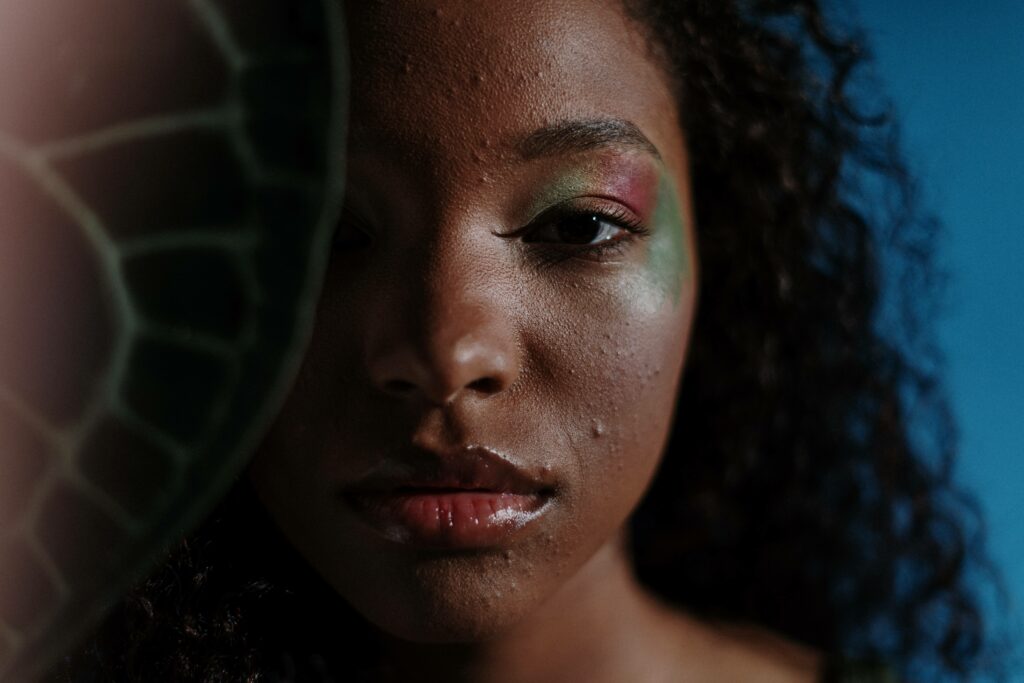
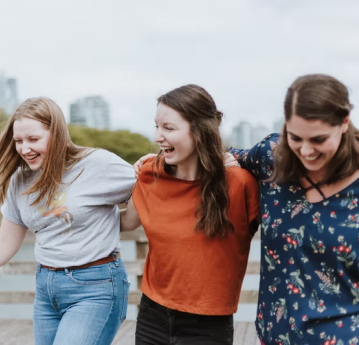
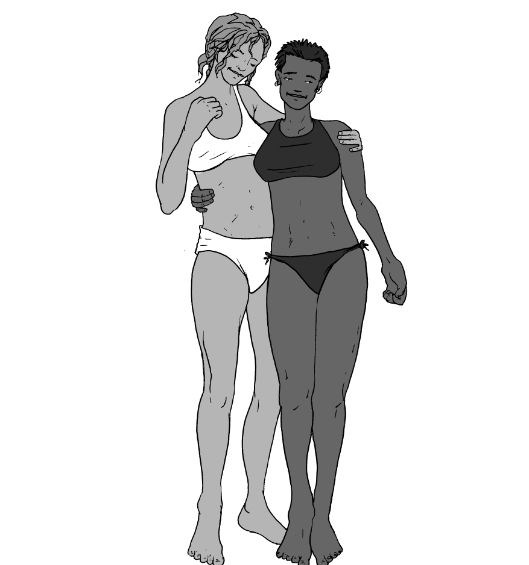
Support, information and engagement


Share your story to help us grow the BSPAD community
Your story can help others to understand and learn more about their condition.
Get in touch


